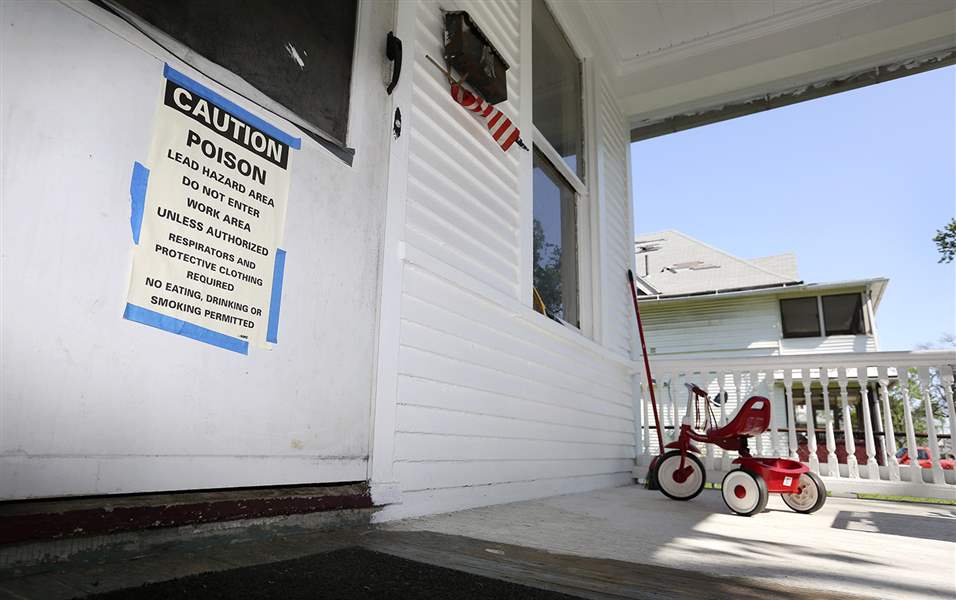
Lucas Co. judge calls Toledo lead law discriminatory and unconstitutional
7/20/2018
A lead hazard sign is posted on a home on Putnam Street in Toledo.
THE BLADE
Buy This Image
A Lucas County judge has issued a permanent injunction, ruling that Toledo and the health department cannot enforce the city’s controversial lead-safe rental law, and deeming it unconstitutional and discriminatory.
In a lengthy ruling late Friday, Common Pleas Judge Linda Jennings found the law discriminates against owners of smaller rentals over owners of large complexes and owner-occupied homes. She also ruled the city of Toledo does not have the authority to grant enforcement powers to the Toledo-Lucas County Health Department.
“I would say it was a ‘benchslap;’ overwhelming decision in our favor,” said Andrew Mayle, attorney for plaintiffs landlord Cheryl Mack and the Property Investors Network. “It was a tour de force of why this ordinance was unconstitutional.”
RELATED: Judge puts Toledo lead law on hold | Residents fear ousting from lead law
Toledo officials said the city will appeal, but Mayor Wade Kapszukiewicz added the judge’s ruling confirms something he’s believed for two years: the lead law ordinance was well-intentioned but ultimately was almost impossible to enforce.
The appeal will focus on broader legal questions about city governance beyond the lead law, the mayor said. At the same time city council will work to craft a new lead ordinance.
A working group of council members, land lords, real estate agents, health department officials, and faith leaders has already started meeting to discuss what a new lead-safe ordinance will look like, the mayor said.
"At the end of this I am confident that we will have an ordinance that is workable, that is enforceable, and also protects the children of Toledo," he said.
The lead law struck down by Judge Jennings was created by city council in 2016 and revised in 2017. It required rental properties with one to four units and home day-care centers built before 1978 be inspected and tested for lead hazards, including the much-debated dust wipe tests to determine lead concentrations.
Mr. Mayle said the permanent injunction was an expected outcome after the judge granted a preliminary injunction just two weeks before the first compliance deadline June 30.
WATCH: Old West End resident Brittany Adams describes uncertainty created by lead law.
Among her findings, Judge Jennings wrote that the law violates the equal protection clauses of the Ohio and United States constitutions because the ordinance “applies to and burdens only owners of rental properties having four or less units, naturally giving the owners of larger rental properties a competitive advantage,” while the law’s objectives state that all residential units built before 1978 are presumed to contain lead-based paint, a serious health threat to children and adults.
Limiting the law to smaller rental units, “while leaving Toledo families who live in pre-1978 rental properties having more than four units, large apartment buildings, or apartment complexes at risk of lead exposure is not rationally, fairly or substantially related to a legitimate government purpose or interest,” the judge wrote.
City Law Director Dale Emch spoke with confidence about the city’s case for appeal.
“We believe Ohio law allows Toledo and the health department to enter into agreements such as the enforcement of the lead-safe law,” Mr. Emch said. “Furthermore, we believe we are on firm constitutional footing in applying the lead-safe regulations to rental properties with four units or less. The city determined that most of the lead poisonings were seen in these rental properties, and therefore we had a rational basis for making this decision.”
Mr. Mayle disagreed.
“If you're going to do that you’ve got to treat everyone equal,” Mr. Mayle said. “It did favor certain landlords over others and singled out our clients. If you think it through, really contradicts the goal of the ordinance.”
Health Commissioner Eric Zgodzinski said late Friday afternoon he hadn’t read the decision in full and couldn’t comment until discussing with the board of health’s attorney and city officials, but said the health department would continue to be aggressive in its pursuits to reduce childhood lead poisoning.
Councilman Larry Sykes, a longtime supporter of the law, said he expected the judge would rule as she did. He called it a "sad day for Toledo."
"Toledo was looked at as a leader of the lead law and of policies to protect our children," he said. "This won't stop us."
Mr. Sykes said council will continue to insist homes are lead-free.
"The city will fight it until hell freezes over and then fight on the ice because it's the right thing to do for our children," he said.
Contact Lauren Lindstrom at llindstrom@theblade.com, 419-724-6154, or on Twitter @lelindstrom.